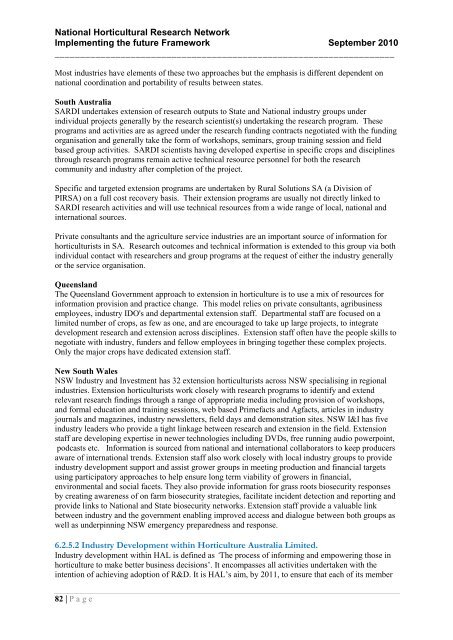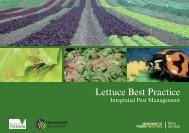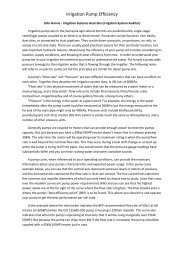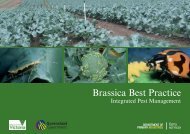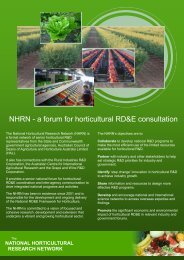National Horticultural Research Network - Horticulture Industry ...
National Horticultural Research Network - Horticulture Industry ...
National Horticultural Research Network - Horticulture Industry ...
You also want an ePaper? Increase the reach of your titles
YUMPU automatically turns print PDFs into web optimized ePapers that Google loves.
<strong>National</strong> <strong>Horticultural</strong> <strong>Research</strong> <strong>Network</strong><br />
Implementing the future Framework September 2010<br />
___________________________________________________________________<br />
Most industries have elements of these two approaches but the emphasis is different dependent on<br />
national coordination and portability of results between states.<br />
South Australia<br />
SARDI undertakes extension of research outputs to State and <strong>National</strong> industry groups under<br />
individual projects generally by the research scientist(s) undertaking the research program. These<br />
programs and activities are as agreed under the research funding contracts negotiated with the funding<br />
organisation and generally take the form of workshops, seminars, group training session and field<br />
based group activities. SARDI scientists having developed expertise in specific crops and disciplines<br />
through research programs remain active technical resource personnel for both the research<br />
community and industry after completion of the project.<br />
Specific and targeted extension programs are undertaken by Rural Solutions SA (a Division of<br />
PIRSA) on a full cost recovery basis. Their extension programs are usually not directly linked to<br />
SARDI research activities and will use technical resources from a wide range of local, national and<br />
international sources.<br />
Private consultants and the agriculture service industries are an important source of information for<br />
horticulturists in SA. <strong>Research</strong> outcomes and technical information is extended to this group via both<br />
individual contact with researchers and group programs at the request of either the industry generally<br />
or the service organisation.<br />
Queensland<br />
The Queensland Government approach to extension in horticulture is to use a mix of resources for<br />
information provision and practice change. This model relies on private consultants, agribusiness<br />
employees, industry IDO's and departmental extension staff. Departmental staff are focused on a<br />
limited number of crops, as few as one, and are encouraged to take up large projects, to integrate<br />
development research and extension across disciplines. Extension staff often have the people skills to<br />
negotiate with industry, funders and fellow employees in bringing together these complex projects.<br />
Only the major crops have dedicated extension staff.<br />
New South Wales<br />
NSW <strong>Industry</strong> and Investment has 32 extension horticulturists across NSW specialising in regional<br />
industries. Extension horticulturists work closely with research programs to identify and extend<br />
relevant research findings through a range of appropriate media including provision of workshops,<br />
and formal education and training sessions, web based Primefacts and Agfacts, articles in industry<br />
journals and magazines, industry newsletters, field days and demonstration sites. NSW I&I has five<br />
industry leaders who provide a tight linkage between research and extension in the field. Extension<br />
staff are developing expertise in newer technologies including DVDs, free running audio powerpoint,<br />
podcasts etc. Information is sourced from national and international collaborators to keep producers<br />
aware of international trends. Extension staff also work closely with local industry groups to provide<br />
industry development support and assist grower groups in meeting production and financial targets<br />
using participatory approaches to help ensure long term viability of growers in financial,<br />
environmental and social facets. They also provide information for grass roots biosecurity responses<br />
by creating awareness of on farm biosecurity strategies, facilitate incident detection and reporting and<br />
provide links to <strong>National</strong> and State biosecurity networks. Extension staff provide a valuable link<br />
between industry and the government enabling improved access and dialogue between both groups as<br />
well as underpinning NSW emergency preparedness and response.<br />
6.2.5.2 <strong>Industry</strong> Development within <strong>Horticulture</strong> Australia Limited.<br />
<strong>Industry</strong> development within HAL is defined as ‘The process of informing and empowering those in<br />
horticulture to make better business decisions‟. It encompasses all activities undertaken with the<br />
intention of achieving adoption of R&D. It is HAL‟s aim, by 2011, to ensure that each of its member<br />
82 | P a g e


